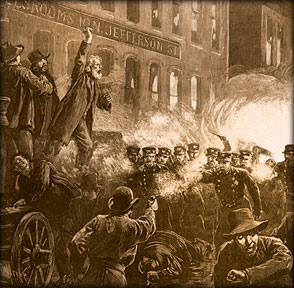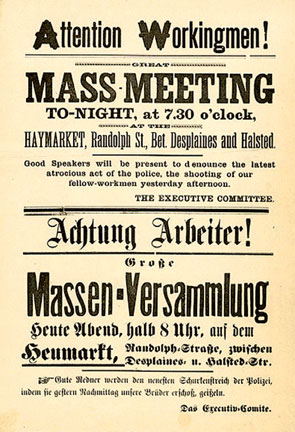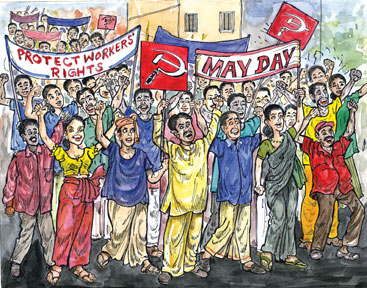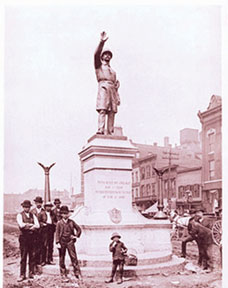May Day brings workers’ hidden power to the fore
By Dhaneshi Yatawara
On a path cleared and strengthened by their blood, sweat and tears,
we march towards another May Day, not just through flashbacks of a dark
history, but as a day that reminds us of the hidden power of
hard-working people.
Irrespective of doubts whether we genuinely remember the sacrifices
the working men and women made in those days, we still remember to keep
International Workers’ Day special since the Socialist’s Second
International in 1889 decided to remember the Martyrs of the 1886
Haymarket Affair every year on May 1.
 |
|
This 1886 engraving was the most
widely reproduced image of the Haymarket Affair. It
inaccurately shows Samuel Fielden speaking, the bomb
exploding and the rioting beginning simultaneously |
 The Haymarket tragedy in Chicago in the United States, at the end of
a workers’ general strike demanding an ‘eight-hour workday’, became an
eye-opener, depicting the true picture of the hard-working labourer of
those days. The police were trying to disperse a public assembly during
the general strike, when an unidentified person threw a bomb at them.
The police reacted by firing on the workers, killing dozens of
demonstrators and several of their own officers. The Haymarket tragedy in Chicago in the United States, at the end of
a workers’ general strike demanding an ‘eight-hour workday’, became an
eye-opener, depicting the true picture of the hard-working labourer of
those days. The police were trying to disperse a public assembly during
the general strike, when an unidentified person threw a bomb at them.
The police reacted by firing on the workers, killing dozens of
demonstrators and several of their own officers.
Two of the leaders who spoke at the rally, Albert Parsons and August
Spies, as well as fellow anarchists, George Engel and Adolph Fisher,
were arrested, tried and executed by the state in 1887 for being
responsible for the bomb attack and triggering violence during the
strike, according to historical records. Another activist, Louis Lingg
was condemned to death, but killed himself in prison, records state.
Three other workers, Michael Schwab, Samuel Fielden and Oscar Neebe
were pardoned in 1893. The police firing at an unarmed group of
civilians was heavily criticised while testimonies proved the innocence
of the workers. Considering the era and the comparatively less connected
world, the incident was never pushed under the rug.
Eight-hour workday
The world has moved far and long since then, in many cases replacing
man with machines. Yet, the rule that was established to protect the
working class remains intact though demands of the present
business-minded people may lead to those rules being altered.
This ‘eight-hour workday’ concept brought in a balance between profit
earning and the workers not being exploited.
One of the chief organisers and speakers at the Haymarket general
strike, Albert Parsons, had told the Court hearing later, “Now, the
money-makers, the businessmen, those people who deal in stocks and
bonds, the speculators and employers, all that class of men known as the
money-making class, have no conception of this labour question; they
don’t understand what it means.
To use the street parlance, with many of them it is a difficult
matter to “catch on to” it, and they are perverse also; they will have
no knowledge of it, anything about it, and they won’t hear anything
about it, and they propose to club, lock up, and, if necessary, strangle
those who insist on their hearing this question. Can it be any longer
denied that there is such a thing as the labour question?”
The famous speeches of the eight Chicago anarchists in court, when
asked if they had anything to say as to why the sentence should not be
passed on them, reveals an alarming social and economic issue that
remained in the United States of that time. One could however question
whether we see any difference today.

 |
|
Workers finish installing a statue of
a Chicago policeman in Haymarket Square in 1889. The statue
now stands at the Chicago Police Headquarters |
As Parsons said in his speech at the Court, “A wage-worker is one who
works for wages and who has no other means of subsistence than by the
selling of his daily toil from hour to hour, day to day, week to week,
month to month, and year to year, as the case may be. Their property
consists entirely of their labour - strength and skill or, rather, they
possess nothing, but their bare hands.
“They live only when afforded an opportunity to work, and this
opportunity of the means of subsistence - capital - before their right
to live at all or the opportunity to do so is possessed.” Does not this
describe today’s working class as well?
Employees and employers
Since the Haymarket tragedy, many strikes and fights have taken place
between employees and employers throughout the world and so it will
continue as long as Planet Earth exists. However harsh and bitter the
situation could be, thousands of brave men and women laid the foundation
for the world, to seek justice for workers.
Another question still remains to be answered - Do people have to
die, sacrifice themselves or be tortured every time, for the world to be
concerned? Don’t we have enough bitter experiences? Why cannot people
sit, discuss and listen to others’ woes and act on them rather than wait
for the needy party to react with extremism or violence? Let the May Day
remind us that it promotes the ‘give and take policy’ to bring justice
to a world of demands and rights.
As it is said in the poem The worker’s Maypole by Walter Crane,
“Your cause is the hope of the world,
In your strife is the life of the race,
The workers’ flag Freedom unfurled
Is the veil of the bright future’s face.”
|


